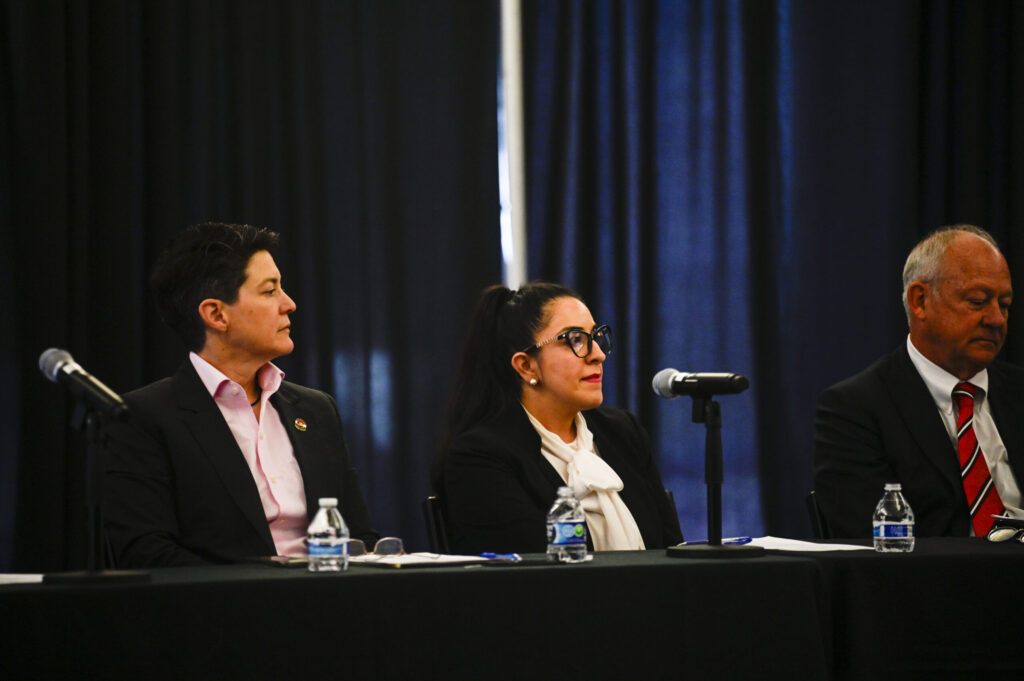Divided Colorado Supreme Court upholds police’s pat-down of man in ‘wrong place at the wrong time’
The Colorado Supreme Court decided on Tuesday that police had not unlawfully seized a man when they patted him down in a chance encounter after he suddenly appeared outside the motel room where they were preparing to make an arrest.
By 5-2, the justices believed Oscar Jonas Ganaway consented to the pat-down search, which resulted in Denver and Glendale police discovering narcotics and learning Ganaway was illegally possessing a gun. Because Ganaway’s interaction with officers was voluntary, the majority decided there was no violation of the Fourth Amendment’s prohibition on unreasonable searches and seizures.
Justice Brian D. Boatright, in the May 27 opinion, noted it was Ganaway who approached the officers, not the other way around.
“Here, the police never ordered Ganaway to say or do anything. The officers were facing Ganaway in a line as he approached them,” wrote Boatright. There was “nothing preventing Ganaway from terminating the interaction with the police, as he could have turned around and exited the motel parking lot by car or by foot.”
Justice Maria E. Berkenkotter did not dispute the narrative of events, but she believed that from Ganaway’s perspective, suddenly running into a large group of police officers asking to do a pat-down would not have seemed consensual.
“In my view, this was a single encounter in which Ganaway was stopped and searched by the police without reasonable suspicion because he was in the wrong place at the wrong time. This was a seizure,” she wrote for herself and Justice Richard L. Gabriel in dissent.
Based on testimony from some who were present, a group of approximately eight Glendale and Denver officers were preparing to arrest a suspected drug smuggler at his Glendale motel. The plan was for the suspect’s parole officer to knock on the door from the outdoor corridor, and the officers had gotten in a line to move toward the guest room.
However, as they approached the door, Ganaway parked in the distance, got out and started walking toward them. Ganaway was looking down and did not notice the officers, but they saw him and halted.
When Ganaway was within 20 feet, an officer asked where Ganaway was going. Ganaway stopped, pointed to the same guest room the officers were approaching and looked surprised. A detective was concerned about a heavy looking object visible in Ganaway’s hoodie and said, “I’d like to pat you down for weapons, if that’s OK.”
Ganaway responded, “No problem.” Without being asked, he turned around, stuck his arms out to the side and walked backward toward the officers. The detective found no weapons, but rather a bag of what appeared to be methamphetamine.
The detective arrested Ganaway, who then agreed to talk. Ganaway mentioned he was a felon, but he had a gun in his vehicle that he knew he was not allowed to possess. Upon receiving Ganaway’s consent, police recovered the gun from his car.
Meanwhile, police arrested the original suspect from the motel room without incident.
Arapahoe County prosecutors charged Ganaway with being a prior offender in possession of a weapon and for drug possession. The defense moved to exclude the evidence from trial, and District Court Judge David Karpel agreed officers had no reasonable suspicion to seize Ganaway.
“When he arrived close to that door, he was surrounded by law enforcement and he was — his direction of travel was altered by those police officers,” Karpel said. “The record here does not support an existence of a consensual encounter.”
The prosecution immediately appealed to the Supreme Court, arguing law enforcement’s actions when Ganaway “strolled into the police officers’ presence” showed no intent to seize him. Ganaway’s attorney countered that “no reasonable innocent person would have felt free” to decline the pat-down under the circumstances.
The Supreme Court’s majority agreed with the prosecution. Boatright noted that no testimony suggested police “altered” Ganaway’s direction of travel, as Karpel found.
“A reasonable person in Ganaway’s position would have understood that police activity was afoot, but he would not have perceived the officers’ conduct to be directed at him,” Boatright wrote. “They simply asked him one neutral question in a friendly tone, during a brief interaction.”
Because Ganaway consented to the pat-down, the police had not seized him and the evidence was uncovered lawfully, Boatright concluded.
Berkenkotter, in dissent, believed the immediate questioning of Ganaway by a group of police suggested he was not actually free to refuse the pat-down.
“We need only look to his responses to the stop (his jaw literally dropped) and to the ‘request’ that he submit to a patdown search immediately thereafter,” she wrote. “He moved to the officers without, apparently, being asked to do so: first, sticking his arms out like a scarecrow, then looking over his shoulder, and slowly walking backwards until he reached the officers. His was not the behavior of someone who felt free to deny the officer’s request and continue on his way.”
The case is People v. Ganaway.
Colorado Politics Must-Reads:














